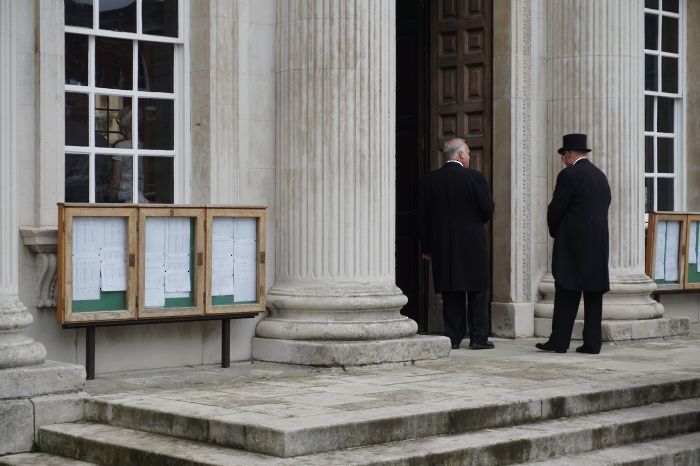Revealed: Decision imminent on the future of class lists
Exclusive: Following a legal consultation, the University has narrowed down possibilities for the future of public exam results to four different options

The University is finally drawing to a close a resolution on the fraught issue of listing students’ exam grades in public, after several years of debate.
New documents from the Education Committee, the central body which oversees Cambridge’s teaching and academic policy, show that a review has narrowed the possible options for the future of class lists to four options, Varsity can reveal.
Class lists have been published in some form since 1748, but they may now be threatened by new data protection regulations. The documents say the University “needs either to identify the alternative legal basis [for ongoing publication] or to seek specific, opt-in consents to inclusion” in the lists.
Under the current system, students’ names and exam results are published on printed lists outside Senate House and published online via the Cambridge University Reporter, the University’s journal of internal business.
Students may obtain an opt-out from the printed lists through a lengthy process, but all students who take exams still have their results appear in the Reporter. In 2016, 39 names were omitted from the Senate House lists; this rose to 86 names in 2017.
In a briefing document which has subsequently been deleted from the University’s website, the Education Committee received legal advice on the four options it now has (excluding total abolition):
There was no discussion about the Lists recorded in the minutes of the Education Committee’s meeting on November 8, for which the briefing document had been prepared. Those minutes, along with all other associated documents, have recently been made inaccessible on the University’s website.
The briefing says a final decision will have to be passed through the General Board of the Faculties. The General Board held a meeting on November 29th, where a recommendation from the Education Committee may have been discussed; this means a decision could have already been passed along to the University Council. A University spokesperson said that minutes from that meeting are not yet available.
An adjustment to the system may not require a statutory change, and thus would not require a vote by the academics and staff who comprise Regent House, especially if the final move is only to simplify the opt-out system.
Legal advice for the briefing was sought by the University from the Legal Services Office and external law firm Shakespeare Martineau. The advice says that the current class lists policy may find itself on shaky legal ground when the EU’s General Data Protection Regulation (GDPR) legislation is implemented early next year.
The origin of this legal difficulty lies in the strengthening of individual rights under GDPR, which alters the existing legal basis for class lists under the Data Protection Act 1998. If the processing of class lists still rests on the consent of the individual, it must now be given more explicitly. Up until now, the University has only maintained consent under its blanket privacy policy.
READ: The full briefing document
The University has received legal guidance on potential options for the future of the class lists. That guidance was later made inaccessible on the University’s website.
Maintaining the class lists with an easier opt-out was the option which most students supported in a referendum last year, following suggestions by campaigners from Save The Class List, the pro-lists campaign. The new document shows that delivering a simple opt-out is a complex task for the University.
An explicit opt-in system – the “risk-averse solution” – could be introduced, but would be difficult to administer according to the document. It would also put the burden of registering to appear on the lists onto students, the majority of whom supported their continued publication. It could also open up the possibility of a passive boycott, in which large numbers of students choose not to opt in, potentially undermining the lists’ integrity.
“My major concern is how the opt-out system would work,” said Keir Murison, who campaigned for the lists to be abolished, “only one that is clear, simple and based solely upon a student’s private consent will be acceptable. I also think that colleges and academics should not advise or suggest which way students go; they should not put their students under pressure to remain on the lists.
“The third option defies the will of students who want a proper opt-out. The fourth may still single out some people who failed, even though not passing an exam is often due to many circumstances, including, but not limited to, mental health issues.”
Given the time it has taken for the University to reach this stage, Murison also criticised Save the Class List for suggesting during the student referendum last year that it would be easy to implement an easier opt-out system.
If an opt-in system is not chosen, an alternative legal basis for class lists must be found. The legal advice states that this would probably be found under the Data Protection Act by the University claiming the publication is a necessity, either in the name of the “public interest”, the University’s “legitimate interests”, or due to a fulfilment of “a contract with the individual”. However, these are all somewhat questionable legal grounds and could leave the University open to legal challenges.

If any legal ground is found for continued publication by default, there is still no legal obligation for the University to provide an opt-out option at all. The demand for an easier opt-out system came from students via the referendum, but the Regent House vote last December did not bind the University into seeking new publication conditions.
The discrepancy in opt-out policy between the Senate House noticeboards and the Reporter arises from the University’s desire to maintain the integrity of its records. No opt-out from the Reporter has ever been available, something Varsity revealed few people were aware of during last year’s referendum. However, the legal advice says that a full and easier opt-out system would help “to preclude a large number of formal objections from students exercising their Article 21 rights” under GDPR which would challenge any legal grounding on which the University would continue the publication of class lists.
An option to publish names without any degree classifications is also floated in the document, which the authors call a “pragmatic solution [which], fundamentally, seems fair and reasonable”. However, this solution would remove the competitive element of the class lists’ publication, and indeed somewhat defeat the point of the name ‘class lists’.
Legal uncertainty also hangs over the tradition of reading aloud then scattering Mathematical Tripos class lists from the balcony at the Senate House. Whether or not scattering counts as “processing” data under GDPR is unclear. This may lead to the scattered lists including only students who have opted in, or excluding those who have opted out, depending on the course the University takes. In the most extreme legal scenario, the practice may have to be ceased, according to the legal advice
 News / University Council rescinds University Centre membership20 February 2026
News / University Council rescinds University Centre membership20 February 2026 News / Hundreds of Cambridge academics demand vote on fate of vet course20 February 2026
News / Hundreds of Cambridge academics demand vote on fate of vet course20 February 2026 News / Judge Business School advisor resigns over Epstein and Andrew links18 February 2026
News / Judge Business School advisor resigns over Epstein and Andrew links18 February 2026 News / Caius students fail to pass Pride flag proposal20 February 2026
News / Caius students fail to pass Pride flag proposal20 February 2026 News / Union cancels event with Sri Lankan politician after Tamil societies express ‘profound outrage’20 February 2026
News / Union cancels event with Sri Lankan politician after Tamil societies express ‘profound outrage’20 February 2026











